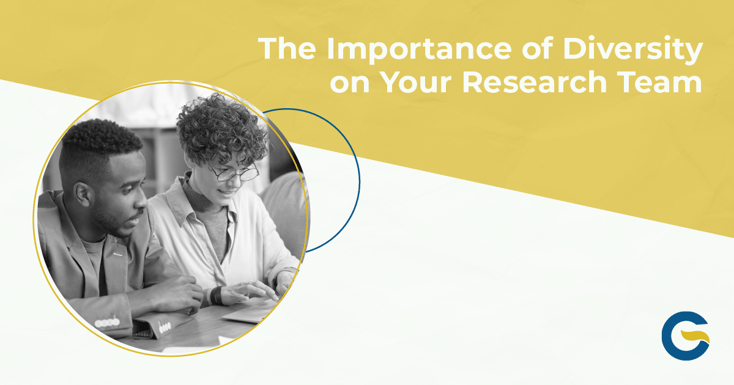Posted by Gazelle Global
The Importance of Diversity on Your Research Team
Perhaps the world is getting smaller. Or perhaps the reach of brands is getting larger. It would not be an overstatement to say that many brands have their eyes on a global market.
The biggest markets for some products are outside the United States. But there's a problem. The market research industry has a diversity and inclusion problem, and it has led to situations like:
- Asking questions in a language participants don't speak as a first language
- Including binary male/female options when asking about gender
- Limited response options in forms, forcing participants to select a single racial or ethnic identity
- Building survey sites that are difficult for disabled individuals to use
- Undersampling people of color and the proper statistical significance of their responses
Each of the above scenarios can result in inaccurate data, flawed data processing, and inappropriate messaging. Instead, when researching diverse groups of people, having a diverse research team only make sense. "The true intentionality of having a diverse research team demonstrates a commitment to uncovering the truth about brands. The very essence of consumer research is giving a voice to all proportionately. When diversity starts with your team, a commitment to mitigating the intersectionality of diversity," said Stacey Weber, Vice President of Gazelle Global.
Having a truly diverse team is not always possible for small to medium-size research and consulting firms. Even when brands want to reach out to international and cross-cultural audiences and otherwise diverse groups with sensitivity and appropriate messaging, the limitations of in-house hiring can pose a roadblock. As markets change, new demographics need to be surveyed, and teams look for a more diverse perspective for the proper project set up; the challenge is getting enough diversity while sticking to personnel budgets.
A growing group of consumer insights teams at brands and research and consulting firms alike are looking to their vendors for increased diversity. Before considering team expansion either by direct hire or with an outsourced operational research team, we’ve provided three additional thoughts on the foundational need for diversity on research teams.
The Myth of English as a Universal Language
![]() Many clients spend more time planning the financial details for a study than the factors that ensure a strong human-to-human connection with their participants. Often deploying international research in English with people who don't speak English as their first language. Not only is this culturally insensitive, but forcing someone to engage in a language they're not comfortable with is not going to produce accurate data. Even in the U.S., over 41 million people speak Spanish at home.
Many clients spend more time planning the financial details for a study than the factors that ensure a strong human-to-human connection with their participants. Often deploying international research in English with people who don't speak English as their first language. Not only is this culturally insensitive, but forcing someone to engage in a language they're not comfortable with is not going to produce accurate data. Even in the U.S., over 41 million people speak Spanish at home.
To exacerbate the language problem, phone interviews are still a primary data collection method in some parts of the world. But when relying on an English-based question guide and the people answering the phone don't speak English, the study will inevitably be stunted at best, or completely misinterpreted at worst. Saving money by not paying for translation services is poor practice. Great translation that enhances the work and purpose of the study is one that considers cultural references, historical sensitivities, regional dialects, and more. Google translate or allowing a team member with language skills to translate pieces of the research puts the results at risk. For qualitative work, this is especially true as translation needs to be done both ways. The initial research instruments must be translated before they go into the field, and the translation of open-ends or focus group transcripts back into the native language of the researcher needs to be done for analysis.
While people may speak English, that does not mean they are proficient enough to share personal opinions or feelings accurately with a stranger.
The Focus of Crafting the Message
![]() The point of diversity on your research team is to shorten the distance between researcher and participant. Making personal connections matters when crafting the wording of any research deliverable from survey programming, focus group moderator’s guides, screener, etc. “When members of your team share a similar background with the research targets, that elicits a more personal response,” explains Anne Brown, President of Gazelle Global. “With my years of experience around the world, I know that carefully choosing members of the research team for fieldwork is an important part of obtaining rich insights because there is a symbiotic relationship that can be set up for project success.”
The point of diversity on your research team is to shorten the distance between researcher and participant. Making personal connections matters when crafting the wording of any research deliverable from survey programming, focus group moderator’s guides, screener, etc. “When members of your team share a similar background with the research targets, that elicits a more personal response,” explains Anne Brown, President of Gazelle Global. “With my years of experience around the world, I know that carefully choosing members of the research team for fieldwork is an important part of obtaining rich insights because there is a symbiotic relationship that can be set up for project success.”
Take, for example, a basic screener question asking participants about their gender identity. When a project kicks off by asking someone if they are male or female, that language immediately excludes non-binary and trans individuals. This may seem like a basic question without the need for nuance or sensitivity, but when you look back at the market research team asking the question, historically it has been a very homogenous group of people who may not intend to exclude or marginalize entire groups of people, but do so nevertheless.
There are many more examples of a need for carefully crafting your research message. Examples include language, dialects, use of slang, perspectives on age and even gender issues that govern the ability of a researcher of one gender to speak directly with a research participant of another gender. For the best research outcomes, the study must be set up with an understanding of the specific population(s) being studied. Research that requires in-person engagement often means working with a local liaison to help facilitate research.

The Importance of Representative Sample
![]() Regardless of the data collection method, traditional research has historically been white research. Meaning that unless you oversample people of color, you're not going to have enough sample in any of those buckets to get valuable insights. Many researchers face the option to continue under-sampling people of color and overweighing their responses to slice and dice the results into subsections that don't exist. For more accurate data, researchers need to begin putting thought into their sampling practices. Having a representative sample removes the opportunity for error in the final analysis.
Regardless of the data collection method, traditional research has historically been white research. Meaning that unless you oversample people of color, you're not going to have enough sample in any of those buckets to get valuable insights. Many researchers face the option to continue under-sampling people of color and overweighing their responses to slice and dice the results into subsections that don't exist. For more accurate data, researchers need to begin putting thought into their sampling practices. Having a representative sample removes the opportunity for error in the final analysis.
Let’s Talk Diversity
As researchers, we're much more aware of the opportunities to improve diversity than clients are. But a concerted effort must be made to broach the subject with all stakeholders. For in-house research teams, this means getting buy-in from what can often be a siloed environment. Getting people across departments to discuss the importance of diversity in research is the first step to getting the right funding for proper project scope.
For those who use outsourced teams as a way of expanding capabilities without expanding overhead, this conversation may depend on the quality of the relationship with the end client. Even a third-party sample provider with experience bringing diversity to the forefront of project conversations can help get a dialogue going. "We're very happy to join calls with the client and market research firm because they do need to have that kind of knowledge, that kind of experience, and they want their clients to hear that the people who are doing the fieldwork work know what they're doing," says Belinda Brown, Business Development Officer on the Gazelle Global team.
Great communication and total transparency help break down the process to create the most appropriate project for the business outcome requirements. Having multiple teams with the ability to suggest new ways of doing things can underscore the commitment to diversity in every aspect of research.
Have a global study or just need some diversity on your team for localized research? Let the Gazelle Global team help you get your project started on the right track.
Your projects are unique. From qualitative to quantitative, we can match an expert to your project to get it in the field and get insights quickly. Download the Global Market Research Bidding Prep Worksheet and complete the task at hand on time and on budget with full confidence.
Topics: Global Research Service




